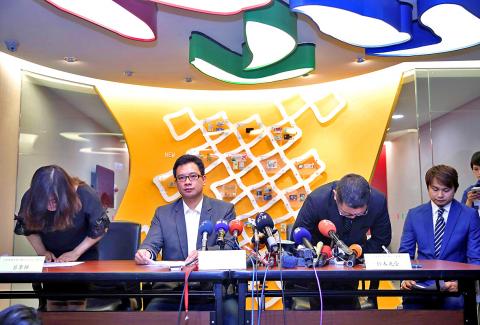The Japanese agent and personal representative of Yui Hatano, a Japanese adult video actress, yesterday bowed at a Taipei news conference to apologize for providing a previously published photograph for Taipei EasyCard Corp (悠遊卡公司) to use in a series of special-edition cards.
The company had invited Hatano to Taiwan for a photography session to produce images for two versions of her card, one “angel” and one “demon.”
Although the cards were not scheduled to be launched until Tuesday next week, there had already been a lot of discussion on the Internet, not only about the choice of Hatano, but that one image had been used on the cover of one of her adult videos.

Photo: CNA
EasyCard chairman Tai Chi-chuan (戴季全) said that a temporary hold had been placed on sales of the “angel” card, adding that there would be restrictions on where the card could be purchased so that buyer’s age requirements could be enforced.
However, he said the company had done nothing illegal in selecting Hatano as a model.
Asked if Hatano’s status as an adult video star might harm the reputation of the company and the Taipei City Government, he said that he had not violated “public decency” or intended to challenge legal limits.
The controversy was the result of cultural differences between Japan and Taiwan, he said.
Hatano’s agent, Mitsukazu Suzuki, and personal representative Lu Chi-hua (呂季樺) apologized for providing an old photograph.
Suzuki said that while his company had full authorization to provide both pictures, Japanese and Taiwanese had different understandings about using previously publicized photographs.
He said that a new photograph of Yui would be taken for the “angel” card.
He said his firm had represented Hatano for four years and was working to downplay her image as an adult video star.
Lu read a statement from Hatano, who said she was happy to have the opportunity to work with EasyCard, even though her pictures might create controversy.
“Although I am an adult video star, does that mean I cannot give back to Taiwan?” she said in the statement read by Lu.
Although the cards have not been released, seven “angel” cards with the controversial photo were listed yesterday on the Ruten online auction site, priced at more than NT$40,000.
EasyCard spokesman Lin Hsiao-chi (林筱淇) said she had taken 10 sets of the cards out of storage on Wednesday so the media could take pictures, but had lost track of seven sets.
EasyCard had contacted the sellers of the cards on Ruten — but is not considering legal action at this time, she said.
Additional reporting by Abraham Gerber

The CIA has a message for Chinese government officials worried about their place in Chinese President Xi Jinping’s (習近平) government: Come work with us. The agency released two Mandarin-language videos on social media on Thursday inviting disgruntled officials to contact the CIA. The recruitment videos posted on YouTube and X racked up more than 5 million views combined in their first day. The outreach comes as CIA Director John Ratcliffe has vowed to boost the agency’s use of intelligence from human sources and its focus on China, which has recently targeted US officials with its own espionage operations. The videos are “aimed at

STEADFAST FRIEND: The bills encourage increased Taiwan-US engagement and address China’s distortion of UN Resolution 2758 to isolate Taiwan internationally The Presidential Office yesterday thanked the US House of Representatives for unanimously passing two Taiwan-related bills highlighting its solid support for Taiwan’s democracy and global participation, and for deepening bilateral relations. One of the bills, the Taiwan Assurance Implementation Act, requires the US Department of State to periodically review its guidelines for engagement with Taiwan, and report to the US Congress on the guidelines and plans to lift self-imposed limitations on US-Taiwan engagement. The other bill is the Taiwan International Solidarity Act, which clarifies that UN Resolution 2758 does not address the issue of the representation of Taiwan or its people in

SHIFT: Taiwan’s better-than-expected first-quarter GDP and signs of weakness in the US have driven global capital back to emerging markets, the central bank head said The central bank yesterday blamed market speculation for the steep rise in the local currency, and urged exporters and financial institutions to stay calm and stop panic sell-offs to avoid hurting their own profitability. The nation’s top monetary policymaker said that it would step in, if necessary, to maintain order and stability in the foreign exchange market. The remarks came as the NT dollar yesterday closed up NT$0.919 to NT$30.145 against the US dollar in Taipei trading, after rising as high as NT$29.59 in intraday trading. The local currency has surged 5.85 percent against the greenback over the past two sessions, central

US Indo-Pacific Commander Admiral Samuel Paparo on Friday expressed concern over the rate at which China is diversifying its military exercises, the Financial Times (FT) reported on Saturday. “The rates of change on the depth and breadth of their exercises is the one non-linear effect that I’ve seen in the last year that wakes me up at night or keeps me up at night,” Paparo was quoted by FT as saying while attending the annual Sedona Forum at the McCain Institute in Arizona. Paparo also expressed concern over the speed with which China was expanding its military. While the US